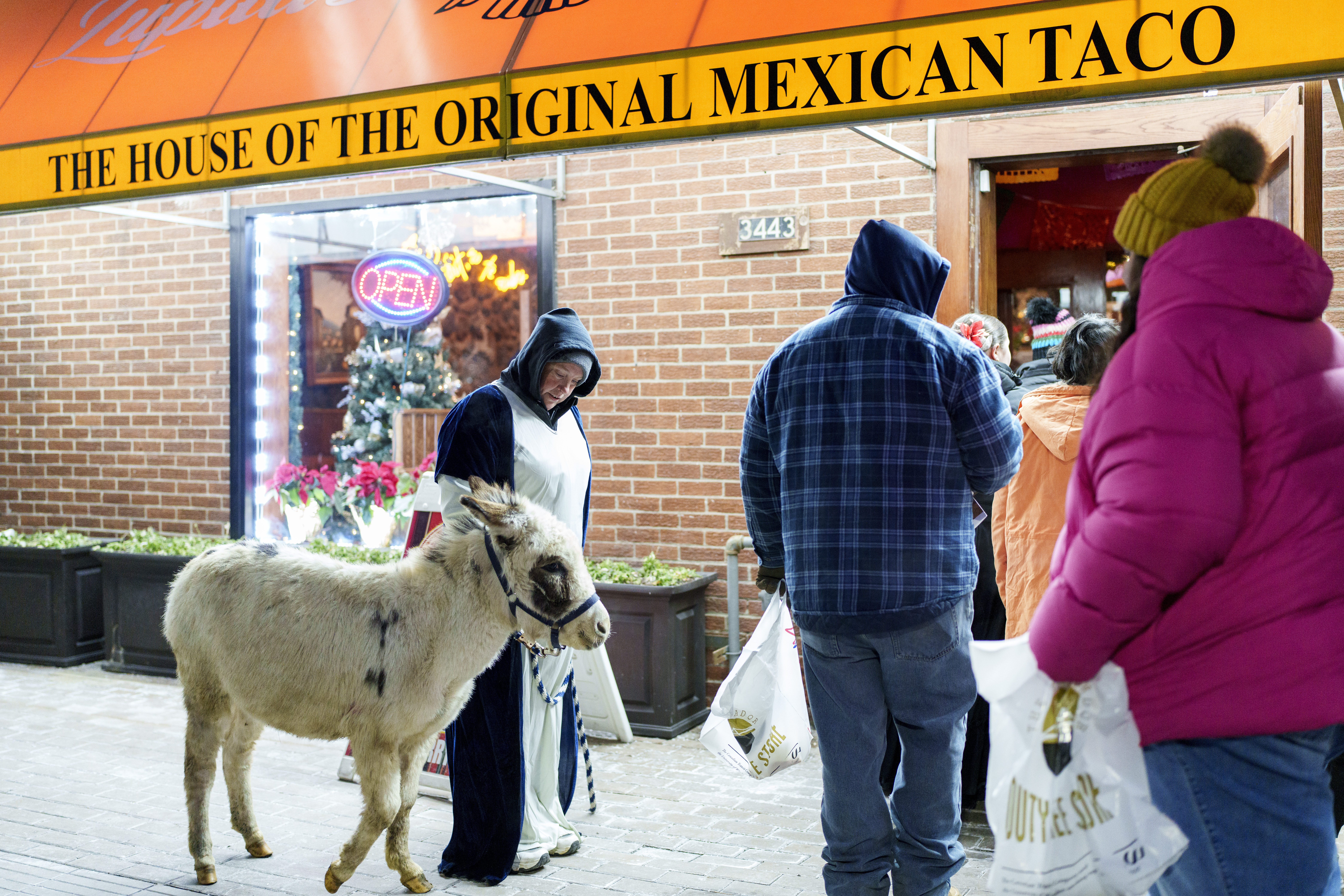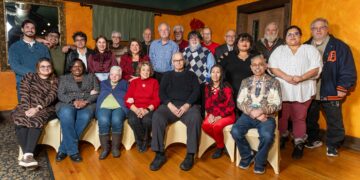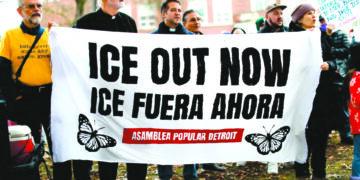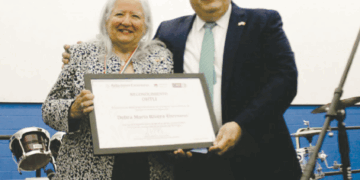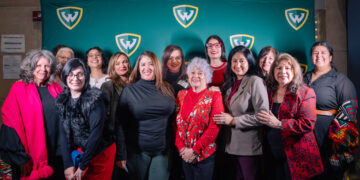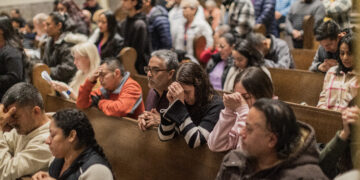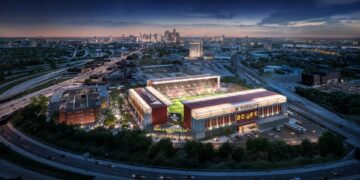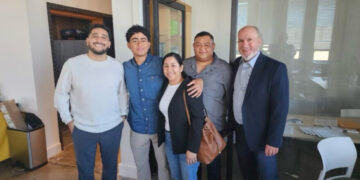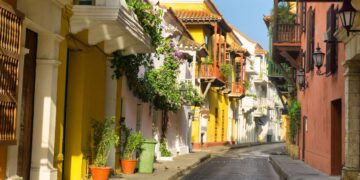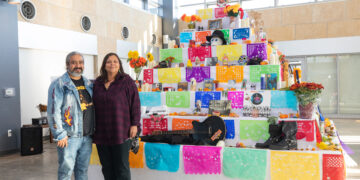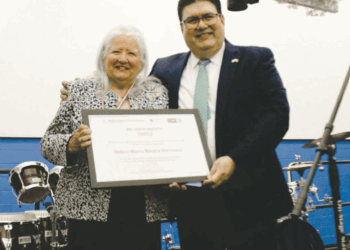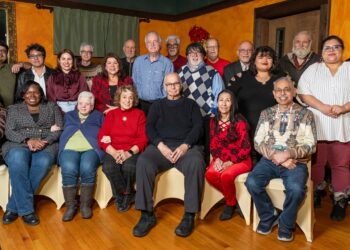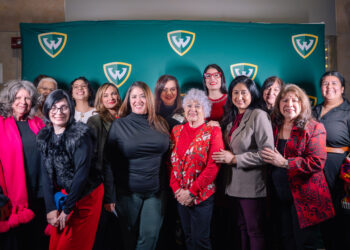Detroiters who live or work in Southwest Detroit gathered at the offices of EL CENTRAL Hispanic News to discuss matters in the month before the general election. Photo by Nina Ignaczak.
Overview:
- Planet Detroit’s recent listening session in Southwest Detroit highlighted the community’s concerns about air pollution, gentrification, and political apathy.
- Participants emphasized the need for bilingual and culturally competent staff in local government and schools, as well as the importance of addressing reproductive rights and air quality controls.
- The community also called for better enforcement of truck routes and idling regulations to address air pollution.
One of my favorite things about Planet Detroit is our focus on community journalism. It’s not enough to write about the environmental and public health issues that impact a community.
We want to understand better Southwest’s nuances—the communities within the community—to ensure that everyone sees themselves in our coverage.
We held our first elections-related listening session earlier this month at EL CENTRAL Newsroom in Southwest Detroit. There, we had a lively conversation –mostly in English with some Spanish thrown in – with the grassroots community about the need for better air quality controls and voter engagement in light of threats to reproductive rights.
We’ve covered these topics since we first launched in 2019 and will continue to do so.
Thanks to tips from the discussion, we now plan to report on the need for bilingual and culturally competent staff in local government and schools to serve the diverse community better.
So, Southwest Detroiters, do you have a tip or an idea I should look into? Please don’t wait until our next listening session – email me anytime at isabelle@planetdetroit.org.
Here’s how six members living or working in Southwest Detroit responded to our questions.
What makes you love and feel hopeful about living in Southwest Detroit?
Karen Cardenas, communications director of MiPoder, emphasized the community’s efforts to create an environment that fosters a sense of belonging and cultural pride.
“Everyone is coming from all different diasporas. To want to build your community, your home, your yard…everything that’s immediately surrounding your living space into something as close to home as possible,” Cardenas said. “It’s a measure of the passion and love that we have for our culture.”
Jorge Casarez, a retired counselor at Southwest Counseling Solutions, highlighted the diversity and stability of Southwest Detroit, mentioning the presence of intact families and the community’s resilience.
Native Southwest Detroiter Estefania Arellano, who works as a family advocate at Head Start in addition to reporting for EL CENTRAL and Planet Detroit, notes the increase in Hispanic-owned businesses and the revitalization of the area. She remembers her teenage self sneaking into the Michigan Central Train Station as she now gazes up at the newly renovated building.
“Watching the train station get fixed up…for me, it represents Detroit. I feel like Southwest is experiencing a revitalization,” Arellano said.
What concerns you most about living in Southwest Detroit?
Nearly in immediate unison, the group responded with air pollution.
Cardenas said it’s “scary that we became a sacrifice zone” and that residents weren’t informed of the extent of the damage to children and adults. Her family lives close to the Springwells neighborhood, situated near four major facilities that all faced air pollution violations within the last year.
Cindy Gamboa, executive director of MiPoder, said child asthma has become normalized. She spoke with a teacher who has a daily ritual where her students turn in their inhalers at the start of class.
Gamboa’s daughter, who has asthma, was raised in Southwest. When she moved her daughter to Taylor for school, her classmates were “shocked” at seeing an inhaler. Casares, too, was shocked when “the snow stayed white” at Michigan State University, where he moved to for college from his native Delray.
Andrew Chicotel, voter engagement lead at the Detroit Hispanic Development Corporation, is concerned about gentrification. As a “guy who grew up around cornfields,” seeing the Vernor strip for the first time made him feel like the main character.
“There’s this picture-perfect main street that corporate America so badly wants to get its fingers into that vibe,” Chicotel said. “I’m so worried about gentrification ruining this beautiful little area.”
In the past 10 years, Lincoln Park has become the city with the highest percentage of Latinx population of any municipality in Southeast Michigan — one out of every four Lincoln Park residents are Latinx.
What issues are bringing you out to vote this year?
Gamboa is angry that her daughter “will probably have less rights” than her, and decried the “vilification of immigrants” by the Trump campaign.
Cardenas said no single issue drives her to vote, as “everything is interconnected” and points to change happening at the hyper-local level.
“On the topic of gentrification, there are so many eyes on us,” Cardenas said. “When they pull up and see these neighborhoods with [high voter turnout], it makes people hesitate before they can really feel like they can step into our neighborhoods and call the shots.”
This community has a voice and is “not afraid to flex it,” Cardenas said.
What are one or two things about voting that you find difficult, worry you, or keep you up at night?
As a voter engagement lead, Chicotel is concerned about political apathy.
“I’ll pull a room of 10 people here to canvas for me, and I’ll say, ‘What day is election day?’ And they don’t know. And these are all adults.”
He thinks many are “drowned out” in work and that civics is no longer being taught as an essential virtue.
Arellano said she’s spoken with many who feel their votes don’t matter because they haven’t seen tangible results from previous elections. She counters this by pointing to the renovation of Roosevelt Park, completed with funds from the American Rescue Plan.
“I’m like, ‘What do you mean he [Biden] hasn’t done anything?’ If you go out into Southwest, you can see all the businesses affected by the American Rescue Plan,” Arellano said.
What could our local elected officials do in the next year to make your community a better place?
Elizabeth Gonzalez with Congress of Communities emphasized the need for local officials to support long-time residents who have contributed to the community but face challenges in obtaining citizenship.
“My husband, he’s an immigrant, he’s lived here for 25 years. He’s raised his whole family, and we bought homes, we paid taxes, and he still can’t get a driver’s license,” Gonzalez said.
Gamboa wants local elected officials to “keep the same energy” of election-time door-knocking throughout the year, not just a month before elections to get her vote.
“They need to keep that door to constituency services open,” Gamboa said.
Ending with the issue that concerns the group the most – air pollution – Gamboa said the city must improve its enforcement of truck routes and idling regulations, as many drivers are aware of the rules but continue to violate them.
Isabelle Tavares covers environmental and public health impacts in Southwest Detroit for Planet Detroit with Report for America. Working in text, film and audio, she is a Dominican-American storyteller who is concerned with identity, generational time, and ecology.

